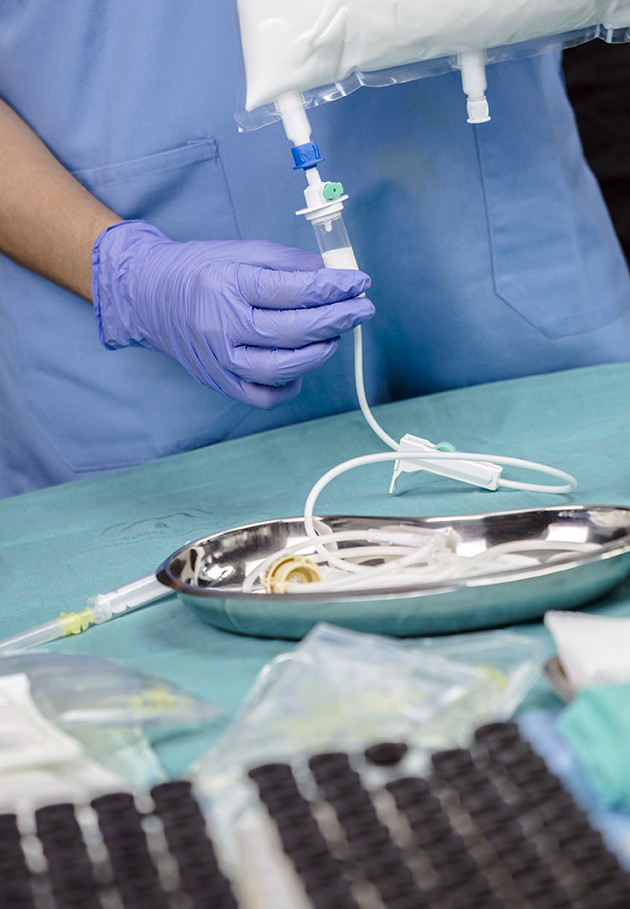
La enfermedad de Crohn fue identificada formalmente en 1932 por su homónimo, el Dr. Burrill B. Crohn, y sus colegas. En un artículo fundamental titulado "Ileítis regional: una entidad patológica y clínica", los autores presentaron una descripción detallada de una enfermedad inflamatoria intestinal (EII) que hoy se conoce como enfermedad de Crohn.
La enfermedad de Crohn afecta áreas del tracto gastrointestinal que van desde la boca hasta el ano, causando dolor, malestar y desnutrición. En este artículo, ofreceremos una descripción general de la enfermedad de Crohn, incluyendo cómo identificarla, cómo hacerse las pruebas y cómo recibir tratamiento para que usted o un ser querido puedan encaminarse hacia una vida más saludable.
Obtenga asistencia para el copago de IgIV
Asistencia financiera para la IgIV¿Cuáles son los síntomas de la enfermedad de Crohn?
Los síntomas de la enfermedad de Crohn pasan por ciclos de brotes y remisiones. Quienes presentan síntomas leves pueden experimentar lo siguiente cuando la enfermedad está activa:
- Diarrea
- Fiebre
- calambres estomacales
- Fatiga
- Falta de apetito
- Pérdida de peso
- llagas en la boca
- heces con sangre
- evacuaciones intestinales urgentes
- Dolor o supuración de una llaga cerca del ano
En casos graves de enfermedad de Crohn, se presentan síntomas adicionales, como inflamación de la piel, los ojos, las articulaciones, el hígado y las vías biliares. Además, con el tiempo, pueden surgir complicaciones como resultado de brotes frecuentes, como obstrucción intestinal, úlceras, fístulas, fisuras anales, desnutrición y cáncer de colon. La desnutrición, causada por la incapacidad del cuerpo para absorber adecuadamente los nutrientes, también puede provocar otros problemas como artritis, anemia, trastornos cutáneos y enfermedades de la vesícula biliar o del hígado.
¿Cuáles son las causas y quién está en riesgo?
Los científicos y médicos aún no han identificado la causa exacta de la enfermedad de Crohn. Los médicos creen que ciertos factores pueden aumentar el riesgo de desarrollarla. Estos factores principales incluyen problemas del sistema inmunitario, antecedentes familiares, genética y factores ambientales. Aunque cualquier persona de cualquier edad puede ser diagnosticada con la enfermedad de Crohn, es más común en las siguientes poblaciones:
- Personas menores de 30 años
- Aquellos con familiares cercanos que padecen la enfermedad.
- Personas de ascendencia de Europa del Este, incluidos los judíos europeos, y cada vez más entre los afroamericanos.
- Países desarrollados, específicamente en comunidades urbanas altamente industriales
Según algunas investigaciones recientes, una dieta rica en alimentos ultraprocesados puede estar relacionada con una mayor incidencia de la enfermedad de Crohn. Estos alimentos incluyen refrigerios envasados, comidas congeladas y carnes procesadas. Por lo tanto, si desea reducir el riesgo de desarrollar la enfermedad de Crohn, es mejor evitarlos.
Otros factores que pueden contribuir a las enfermedades inflamatorias del intestino, como la enfermedad de Crohn, incluyen fumar y tomar antibióticos de forma constante.
Diagnóstico de la enfermedad de Crohn
Las pruebas para la enfermedad de Crohn suelen realizarse después de descartar otros posibles diagnósticos. Los médicos utilizan diversos métodos para detectar la afección, como análisis de sangre para identificar deficiencias vitamínicas, recuentos anormales de proteínas y niveles de anticuerpos. También realizan diversos procedimientos (colonoscopia, tomografía computarizada, resonancia magnética, etc.). cápsula endoscópica, y enteroscopia asistida por balón) para localizar áreas afectadas dentro del tracto gastrointestinal.
¿Puede ayudar la IgIV?
Información gratuita sobre el tratamiento con IgIVManejo de los síntomas de la enfermedad de Crohn
Aunque no existe cura para la enfermedad de Crohn, existen maneras de controlar los síntomas y prevenir o limitar los brotes. El tratamiento para la enfermedad de Crohn está diseñado para ayudar a controlar los síntomas y limitar el daño causado por la inflamación. Estos pueden incluir una combinación de medicamentos, suplementos, terapias y, posiblemente, cirugía.

Los medicamentos comunes para la enfermedad de Crohn incluyen antiinflamatorios, inmunosupresores, antibióticos, antidiarreicos y analgésicos. Dado que la enfermedad afecta la capacidad del cuerpo para absorber los nutrientes de la alimentación habitual, también se suelen recomendar multivitamínicos para prevenir afecciones asociadas con deficiencias vitamínicas. En ocasiones, también se recomienda la terapia nutricional para aliviar la tensión intestinal. Estas terapias incluyen Nutrición enteral (el uso de sondas de alimentación) y nutrición parenteral (nutrientes inyectados en las venas).
En enero de 2025, el FDA Mirikizumab-mrkz (Omvoh) fue aprobado para el tratamiento de la enfermedad de Crohn en adultos. Este fármaco puede reducir la inflamación del tracto digestivo. Actúa dirigiéndose a la interleucina-23p19, que contribuye a la inflamación intestinal.
Además de los tratamientos habituales, ciertos suplementos pueden ayudar a controlar los síntomas de la enfermedad de Crohn. Por ejemplo, la curcumina, un compuesto presente en la cúrcuma, tiene propiedades antiinflamatorias que pueden ayudar a controlar los síntomas. Además, la curcumina puede potenciar la eficacia de los tratamientos habituales.
La inflamación causada por la enfermedad de Crohn puede provocar fístulas, úlceras, fisuras y obstrucciones. Para tratar estas complicaciones, a veces se requiere cirugía para drenar abscesos o extirpar secciones dañadas del tracto digestivo.
Los brotes pueden ocurrir en cualquier momento. Sin embargo, ciertos cambios en el estilo de vida Puede ayudar a minimizar la frecuencia y la gravedad de estos síntomas. Puede empezar por su dieta. Siga una dieta baja en grasas y fibra, y evite las comidas picantes, el alcohol y la cafeína. Beba mucha agua y coma comidas pequeñas a lo largo del día. Evite fumar, ya que puede aumentar el riesgo de desarrollar la enfermedad de Crohn y empeorar los síntomas. Haga todo lo posible por evitar o controlar el estrés con técnicas de relajación y ejercicio.
Lidiar con la enfermedad de Crohn puede ser difícil tanto mental como físicamente. Es recomendable crear un sólido sistema de apoyo que incluya a familiares, amigos y grupos de apoyo. Esto puede reducir el estrés y facilitarle el manejo de esta afección. Grupos de apoyo como... Fundación de Crohn y Colitis Proporcionar numerosos recursos y ayudarle a conectarse con otras personas que enfrentan desafíos similares.
Conclusión
Si usted o un ser querido sospecha que puede tener la enfermedad de Crohn, controle sus síntomas y consulte con su médico sobre la posibilidad de consultar a un gastroenterólogo. Identificar la enfermedad a tiempo y controlarla adecuadamente mediante medicamentos y cambios en el estilo de vida puede ayudarle a recuperar el control de su vida.













